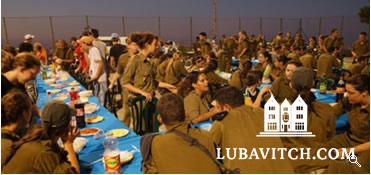On Sunday afternoon, the entire country felt the tragedy. Twelve of Israel’s reserve soldiers were killed in a direct hit by Hizbullah mortar in Kfar Giladi.
Today, as the dead are yet being buried, attention has moved to new exigencies. While the images of the scene—the raw horror and agony of the soldiers who saw their comrades killed—were hard to look at, harder still to forget, Israeli reticence is beginning to make more sense to me. The daily news here is made of tragedies and sacrifices—monumental and rare events in other countries—successive and constant ones here. Where others have time to heal their wounds, in Israel, it’s a luxury no one really can afford. So instead, the heartaches, like the heroes, are buried.
For Israelis, to talk about these things is to dredge up layered-over grief. To dwell on the constant trauma is to become immobilized with anguish. That’s a risk few Israelis, least of all its armed forces, can take. Many officers find themselves apologizing for what they are told appears to be their indifference to the loss of their soldiers. They are anything but that. They just don’t have the conditions that allow them to mourn. “We must go on,” said one officer.
Chabad’s Rabbi Menachem Ofen appreciates this. “The soldiers deserve our constant support and appreciation,” he says. “The sacrifice they are prepared to make, and often do make, is the greatest. We are indebted to them."
I joined Menachem and his wife Shoshana at an army base where they spent several hours giving soldiers a much deserved reprieve. The impetus for this event came from Camp Shachar, an Israel-based camp with campers aged 13-16 from the US and Israel.
“The campers wanted to spend time with soldiers,” Ziva Kramer, the director of the camp told me. They wanted an up close look at Israel’s heroes. But access to army bases is always restricted, even more so during times of war. "I didn’t know how we could arrange this."
“Then,” she says, “one of the parents called me and told me about Menachem Ofen.”
It was probably the highlight for Camp Shachar’s campers, as they danced, sang and shared a barbeque with an IDF unit. The event was sponsored by Rabbi Levi Shemtov of Chabad of Washington, DC and parents of Camp Shachar’s campers, some of whom came with the families, to join their children at the army base.
I spoke with the unit’s commander. I wanted to know what it does for soldiers who are in middle of fighting a war. “You cannot imagine,” he said. “The lift they get from Menachem’s activities, the spiritual boost he gives them is invaluable,” he told me as soldiers had lined up to lay tefillin. “All of them,” he said, “no matter what their background, appreciate this.”
Menachem spoke to the soldiers about tefillin. “This is your spiritual protection,” he said. Shoshana spoke to the female soldiers about lighting Shabbat candles, and then gave each one a gift of a silver-plated candlestick.
They never know what the next mission will be, and how it will end. But tonight, the soldiers lifted the little ones on their shoulders, and as a pink-streaked sky turned to night, they danced to the music, singing Am Yisrael Chai.

Be the first to write a comment.